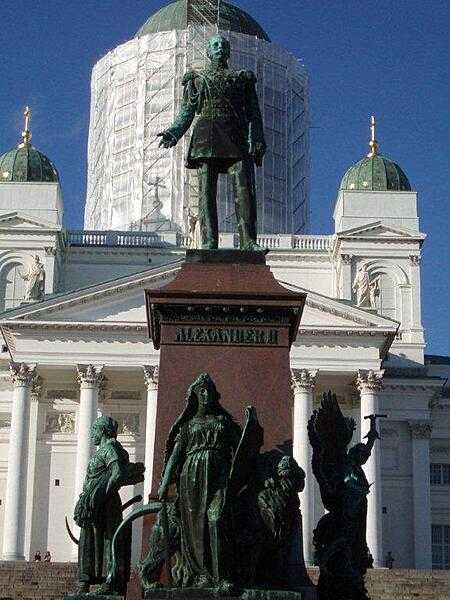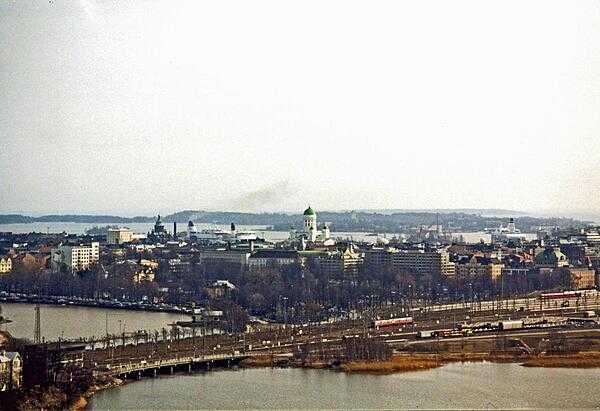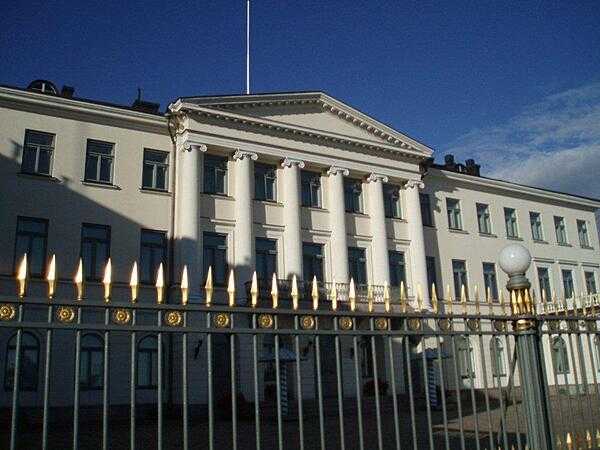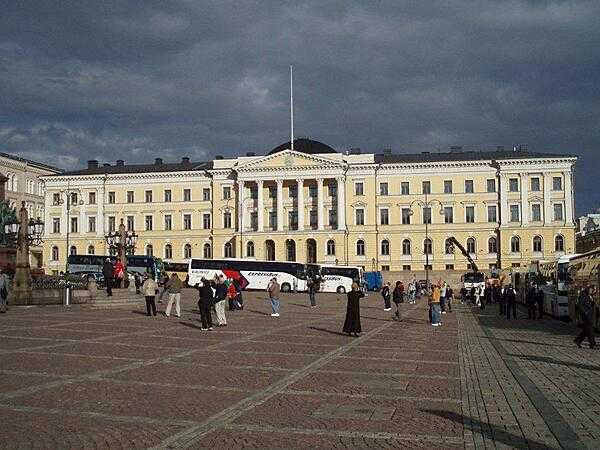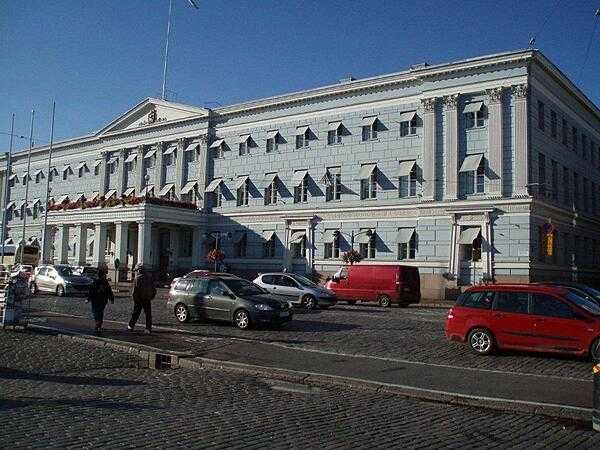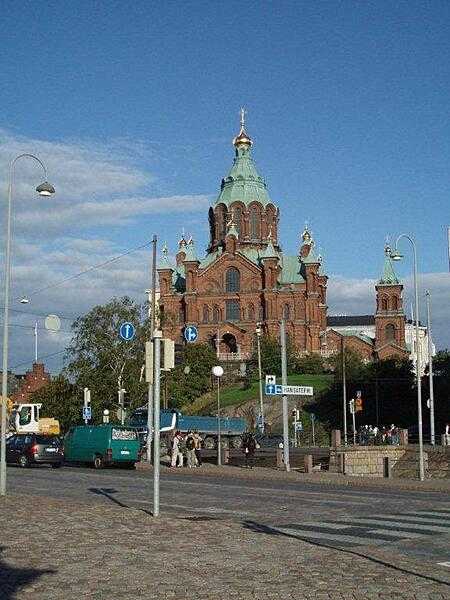Finland - FI - FIN - FIN - Europe
Last updated: January 05, 2026
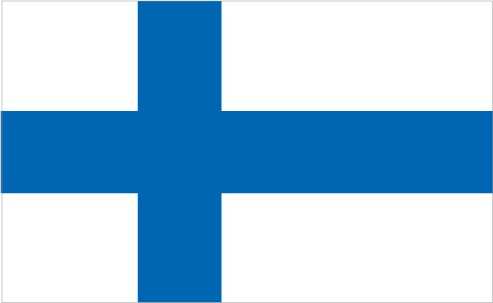
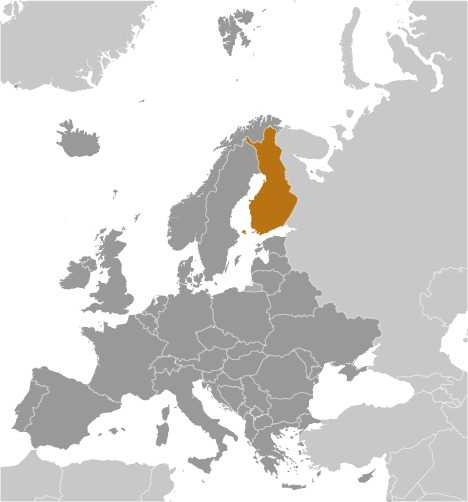
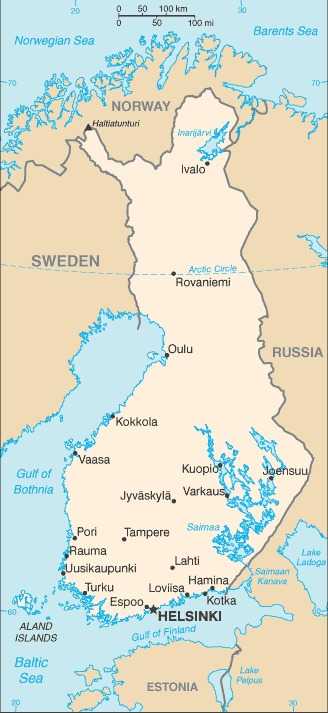
Finland Images
Finland Factbook Data
Age structure
0-14 years: 16.2% (male 464,939/female 444,585)
15-64 years: 60.3% (male 1,725,072/female 1,668,604)
65 years and over: 23.5% (2024 est.) (male 583,645/female 739,569)
15-64 years: 60.3% (male 1,725,072/female 1,668,604)
65 years and over: 23.5% (2024 est.) (male 583,645/female 739,569)
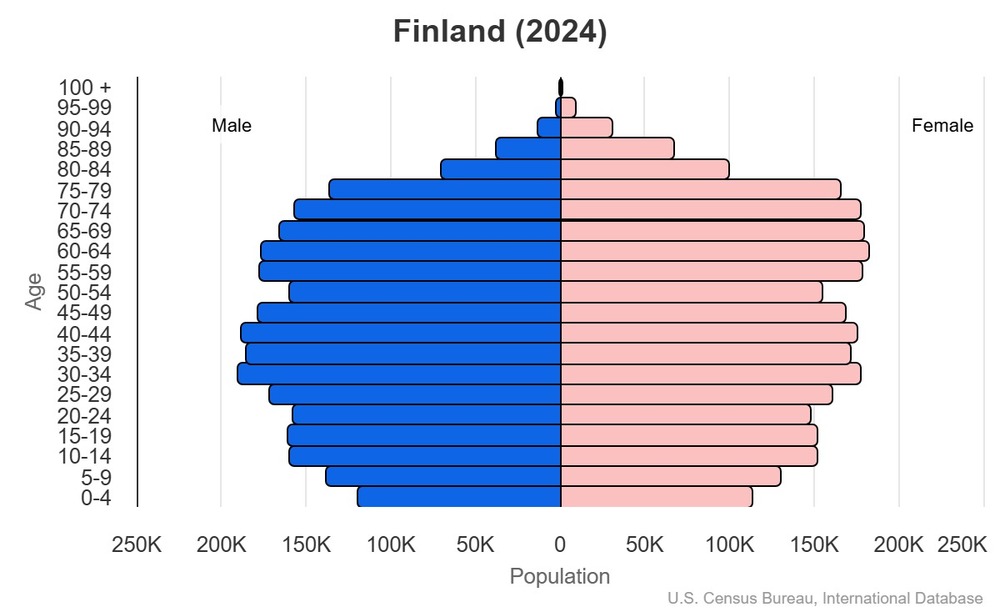
This is the population pyramid for Finland. A population pyramid illustrates the age and sex structure of a country's population and may provide insights about political and social stability, as well as economic development. The population is distributed along the horizontal axis, with males shown on the left and females on the right. The male and female populations are broken down into 5-year age groups represented as horizontal bars along the vertical axis, with the youngest age groups at the bottom and the oldest at the top. The shape of the population pyramid gradually evolves over time based on fertility, mortality, and international migration trends.
For additional information, please see the entry for Population pyramid on the Definitions and Notes page.
For additional information, please see the entry for Population pyramid on the Definitions and Notes page.
Geographic coordinates
64 00 N, 26 00 E
Sex ratio
at birth: 1.05 male(s)/female
0-14 years: 1.05 male(s)/female
15-64 years: 1.03 male(s)/female
65 years and over: 0.79 male(s)/female
total population: 0.97 male(s)/female (2024 est.)
0-14 years: 1.05 male(s)/female
15-64 years: 1.03 male(s)/female
65 years and over: 0.79 male(s)/female
total population: 0.97 male(s)/female (2024 est.)
Natural hazards
severe winters in the north
Area - comparative
slightly more than two times the size of Georgia; slightly smaller than Montana
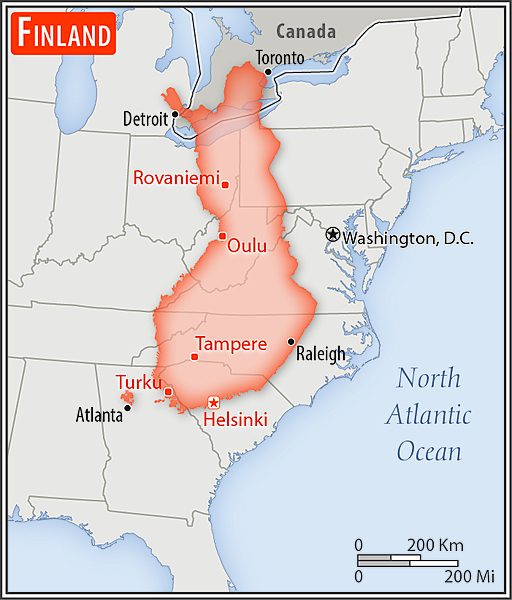
slightly more than two times the size of Georgia; slightly smaller than Montana
Background
Finland was a province and then a grand duchy under Sweden from the 12th to the 19th centuries and an autonomous grand duchy of Russia after 1809. It gained complete independence in 1917. During World War II, Finland successfully defended its independence through cooperation with Germany and resisted subsequent invasions by the Soviet Union, albeit with some loss of territory. During the next half-century, Finland transformed from a farm/forest economy to a diversified modern industrial economy; per-capita income is among the highest in Western Europe. A member of the EU since 1995, Finland was the only Nordic state to join the euro single currency at its initiation in January 1999. In the 21st century, the key features of Finland's modern welfare state are high-quality education, promotion of equality, and a national social welfare system, although the system is currently facing the challenges of an aging population and the fluctuations of an export-driven economy. Following Russia's invasion of Ukraine in 2022, Finland opted to join NATO; it became the organization's 31st member in April 2023.
Environmental issues
limited air pollution in urban centers; some water pollution from industrial wastes, agricultural chemicals; habitat loss threatens wildlife populations
International environmental agreements
party to: Air Pollution, Air Pollution-Heavy Metals, Air Pollution-Multi-effect Protocol, Air Pollution-Nitrogen Oxides, Air Pollution-Persistent Organic Pollutants, Air Pollution-Sulphur 85, Air Pollution-Sulphur 94, Air Pollution-Volatile Organic Compounds, Antarctic-Environmental Protection, Antarctic-Marine Living Resources, Antarctic Treaty, Biodiversity, Climate Change, Climate Change-Kyoto Protocol, Climate Change-Paris Agreement, Comprehensive Nuclear Test Ban, Desertification, Endangered Species, Environmental Modification, Hazardous Wastes, Law of the Sea, Marine Dumping-London Convention, Marine Dumping-London Protocol, Marine Life Conservation, Nuclear Test Ban, Ozone Layer Protection, Ship Pollution, Tropical Timber 2006, Wetlands, Whaling
signed, but not ratified: none of the selected agreements
signed, but not ratified: none of the selected agreements
Military expenditures
2.8% of GDP (2025 est.)
2.4% of GDP (2024 est.)
2.1% of GDP (2023 est.)
1.7% of GDP (2022 est.)
1.4% of GDP (2021 est.)
2.4% of GDP (2024 est.)
2.1% of GDP (2023 est.)
1.7% of GDP (2022 est.)
1.4% of GDP (2021 est.)
Population below poverty line
12.2% (2022 est.)
note: % of population with income below national poverty line
note: % of population with income below national poverty line
Household income or consumption by percentage share
lowest 10%: 3.8% (2022 est.)
highest 10%: 23.1% (2022 est.)
note: % share of income accruing to lowest and highest 10% of population
highest 10%: 23.1% (2022 est.)
note: % share of income accruing to lowest and highest 10% of population
Exports - commodities
paper, refined petroleum, steel, wood pulp, ships (2023)
note: top five export commodities based on value in dollars
note: top five export commodities based on value in dollars
Exports - partners
USA 11%, Germany 11%, Sweden 10%, Netherlands 7%, China 5% (2023)
note: top five export partners based on percentage share of exports
note: top five export partners based on percentage share of exports
Administrative divisions
19 regions (maakunnat, singular - maakunta (Finnish); landskapen, singular - landskapet (Swedish)); Aland (Swedish), Ahvenanmaa (Finnish); Etela-Karjala (Finnish), Sodra Karelen (Swedish) [South Karelia]; Etela-Pohjanmaa (Finnish), Sodra Osterbotten (Swedish) [South Ostrobothnia]; Etela-Savo (Finnish), Sodra Savolax (Swedish) [South Savo]; Kanta-Hame (Finnish), Egentliga Tavastland (Swedish); Kainuu (Finnish), Kajanaland (Swedish); Keski-Pohjanmaa (Finnish), Mellersta Osterbotten (Swedish) [Central Ostrobothnia]; Keski-Suomi (Finnish), Mellersta Finland (Swedish) [Central Finland]; Kymenlaakso (Finnish), Kymmenedalen (Swedish); Lappi (Finnish), Lappland (Swedish); Paijat-Hame (Finnish), Paijanne-Tavastland (Swedish); Pirkanmaa (Finnish), Birkaland (Swedish) [Tampere]; Pohjanmaa (Finnish), Osterbotten (Swedish) [Ostrobothnia]; Pohjois-Karjala (Finnish), Norra Karelen (Swedish) [North Karelia]; Pohjois-Pohjanmaa (Finnish), Norra Osterbotten (Swedish) [North Ostrobothnia]; Pohjois-Savo (Finnish), Norra Savolax (Swedish) [North Savo]; Satakunta (Finnish and Swedish); Uusimaa (Finnish), Nyland (Swedish) [Newland]; Varsinais-Suomi (Finnish), Egentliga Finland (Swedish) [Southwest Finland]
Agricultural products
milk, barley, oats, wheat, potatoes, sugar beets, pork, chicken, peas, rye (2023)
note: top ten agricultural products based on tonnage
note: top ten agricultural products based on tonnage
Military and security forces
Finnish Defense Forces (FDF; Puolustusvoimat): Army (Maavoimat), Navy (Merivoimat), Air Force (Ilmavoimat) (2025)
note: the Border Guard (Rajavartiolaitos) and National Police are under the Ministry of the Interior; the Border Guard becomes part of the FDF in wartime
note: the Border Guard (Rajavartiolaitos) and National Police are under the Ministry of the Interior; the Border Guard becomes part of the FDF in wartime
Budget
revenues: $126.337 billion (2023 est.)
expenditures: $131.978 billion (2023 est.)
note: central government revenues (excluding grants) and expenditures converted to US dollars at average official exchange rate for year indicated
expenditures: $131.978 billion (2023 est.)
note: central government revenues (excluding grants) and expenditures converted to US dollars at average official exchange rate for year indicated
Capital
name: Helsinki
geographic coordinates: 60 10 N, 24 56 E
time difference: UTC+2 (7 hours ahead of Washington, DC, during Standard Time)
daylight saving time: +1hr, begins last Sunday in March; ends last Sunday in October
etymology: the modern name is a Finnish derivation; King Gustav VASA of Sweden founded the city in 1550 as Helsingfors; the name came from Helsing, the Old Norwegian name for a local people, and the word fors, or "waterfall," referring to a waterfall at the city's original location on the Vantaa River
geographic coordinates: 60 10 N, 24 56 E
time difference: UTC+2 (7 hours ahead of Washington, DC, during Standard Time)
daylight saving time: +1hr, begins last Sunday in March; ends last Sunday in October
etymology: the modern name is a Finnish derivation; King Gustav VASA of Sweden founded the city in 1550 as Helsingfors; the name came from Helsing, the Old Norwegian name for a local people, and the word fors, or "waterfall," referring to a waterfall at the city's original location on the Vantaa River
Imports - commodities
crude petroleum, cars, refined petroleum, packaged medicine, broadcasting equipment (2023)
note: top five import commodities based on value in dollars
note: top five import commodities based on value in dollars
Climate
cold temperate; potentially subarctic but comparatively mild because of moderating influence of the North Atlantic Current, Baltic Sea, and more than 60,000 lakes
Coastline
1,250 km
Constitution
history: previous 1906, 1919; latest drafted 17 June 1997, approved by Parliament 11 June 1999, entered into force 1 March 2000
amendment process: proposed by Parliament; passage normally requires simple majority vote in two readings in the first parliamentary session and at least two-thirds majority vote in a single reading by the newly elected Parliament; proposals declared "urgent" by five-sixths of Parliament members can be passed by at least two-thirds majority vote in the first parliamentary session only
amendment process: proposed by Parliament; passage normally requires simple majority vote in two readings in the first parliamentary session and at least two-thirds majority vote in a single reading by the newly elected Parliament; proposals declared "urgent" by five-sixths of Parliament members can be passed by at least two-thirds majority vote in the first parliamentary session only
Exchange rates
euros (EUR) per US dollar -
Exchange rates:
0.924 (2024 est.)
0.925 (2023 est.)
0.95 (2022 est.)
0.845 (2021 est.)
0.876 (2020 est.)
Exchange rates:
0.924 (2024 est.)
0.925 (2023 est.)
0.95 (2022 est.)
0.845 (2021 est.)
0.876 (2020 est.)
Executive branch
chief of state: President Alexander STUBB (since 1 March 2024)
head of government: Prime Minister Petteri ORPO (since 20 June 2023)
cabinet: Council of State or Valtioneuvosto appointed by the president, responsible to Parliament
election/appointment process: president directly elected by absolute-majority popular vote in 2 rounds, if needed, for a 6-year term (eligible for a second term); prime minister appointed by Parliament
most recent election date: 28 January 2024, with a runoff on 11 February 2024
election results:
2024: Alexander STUBB elected in the second round; percent of vote in the first round - Alexander STUBB (KoK) 27.2%, Pekka HAAVISTO (Vihr) 25.8%, Jussi HALLA-AHO (PS) 19.0%, Olli REHN (Kesk) 15.3%; percent of vote in second round - STUBB 51.6%, HAAVISTO 48.4%
2018: Sauli NIINISTO reelected president; percent of vote - Sauli NIINISTO (independent) 62.7%, Pekka HAAVISTO (Vihr) 12.4%, Laura HUHTASAARI (PS) 6.9%, Paavo VAYRYNEN (independent) 6.2%, Matti VANHANEN (Kesk) 4.1%, other 7.7%
expected date of next election: by 28 January 2030
head of government: Prime Minister Petteri ORPO (since 20 June 2023)
cabinet: Council of State or Valtioneuvosto appointed by the president, responsible to Parliament
election/appointment process: president directly elected by absolute-majority popular vote in 2 rounds, if needed, for a 6-year term (eligible for a second term); prime minister appointed by Parliament
most recent election date: 28 January 2024, with a runoff on 11 February 2024
election results:
2024: Alexander STUBB elected in the second round; percent of vote in the first round - Alexander STUBB (KoK) 27.2%, Pekka HAAVISTO (Vihr) 25.8%, Jussi HALLA-AHO (PS) 19.0%, Olli REHN (Kesk) 15.3%; percent of vote in second round - STUBB 51.6%, HAAVISTO 48.4%
2018: Sauli NIINISTO reelected president; percent of vote - Sauli NIINISTO (independent) 62.7%, Pekka HAAVISTO (Vihr) 12.4%, Laura HUHTASAARI (PS) 6.9%, Paavo VAYRYNEN (independent) 6.2%, Matti VANHANEN (Kesk) 4.1%, other 7.7%
expected date of next election: by 28 January 2030
Flag
description: white with a blue cross extending to the edges of the flag; the cross is shifted to the left in the style of the Dannebrog (Danish flag)
meaning: the blue stands for the country's thousands of lakes, and the white for snow
meaning: the blue stands for the country's thousands of lakes, and the white for snow
Independence
6 December 1917 (from Russia)
Industries
metals and metal products, electronics, machinery and scientific instruments, shipbuilding, pulp and paper, foodstuffs, chemicals, textiles, clothing
Judicial branch
highest court(s): Supreme Court or Korkein Oikeus (consists of the court president and 18 judges); Supreme Administrative Court (consists of 21 judges, including the court president; organized into 3 chambers)
judge selection and term of office: Supreme Court and Supreme Administrative Court judges appointed by the president of the republic; judges serve until mandatory retirement at age 68
subordinate courts: 6 Courts of Appeal; 8 regional administrative courts; 27 district courts; special courts for issues relating to markets, labor, insurance, impeachment, land, tenancy, and water rights
note: Finland has a dual judicial system; courts with civil and criminal jurisdiction, and administrative courts with jurisdiction for litigation between individuals and administrative organs of the state and communities
judge selection and term of office: Supreme Court and Supreme Administrative Court judges appointed by the president of the republic; judges serve until mandatory retirement at age 68
subordinate courts: 6 Courts of Appeal; 8 regional administrative courts; 27 district courts; special courts for issues relating to markets, labor, insurance, impeachment, land, tenancy, and water rights
note: Finland has a dual judicial system; courts with civil and criminal jurisdiction, and administrative courts with jurisdiction for litigation between individuals and administrative organs of the state and communities
Land boundaries
total: 2,563 km
border countries (3): Norway 709 km; Sweden 545 km; Russia 1,309 km
border countries (3): Norway 709 km; Sweden 545 km; Russia 1,309 km
Land use
agricultural land: 7.4% (2023 est.)
arable land: 7.4% (2023 est.)
permanent crops: 0% (2023 est.)
permanent pasture: 0% (2023 est.)
forest: 74.2% (2023 est.)
other: 18.4% (2023 est.)
arable land: 7.4% (2023 est.)
permanent crops: 0% (2023 est.)
permanent pasture: 0% (2023 est.)
forest: 74.2% (2023 est.)
other: 18.4% (2023 est.)
Legal system
civil law system based on the Swedish model
Legislative branch
legislature name: Parliament (Eduskunta - Riksdagen)
legislative structure: unicameral
number of seats: 200 (all directly elected)
electoral system: proportional representation
scope of elections: full renewal
term in office: 4 years
most recent election date: 4/2/2023
parties elected and seats per party: National Coalition Party (KOK) (48); The Finns Party (PS) (46); Social Democratic Party (SDP) (43); Center Party (KESK) (23); The Greens (13); Left Alliance (Vas) (11); Other (16)
percentage of women in chamber: 45.5%
expected date of next election: April 2027
legislative structure: unicameral
number of seats: 200 (all directly elected)
electoral system: proportional representation
scope of elections: full renewal
term in office: 4 years
most recent election date: 4/2/2023
parties elected and seats per party: National Coalition Party (KOK) (48); The Finns Party (PS) (46); Social Democratic Party (SDP) (43); Center Party (KESK) (23); The Greens (13); Left Alliance (Vas) (11); Other (16)
percentage of women in chamber: 45.5%
expected date of next election: April 2027
Maritime claims
territorial sea: 12 nm (in the Gulf of Finland - 3 nm)
contiguous zone: 24 nm
continental shelf: 200 m depth or to the depth of exploitation
exclusive fishing zone: 12 nm; extends to continental shelf boundary with Sweden, Estonia, and Russia
contiguous zone: 24 nm
continental shelf: 200 m depth or to the depth of exploitation
exclusive fishing zone: 12 nm; extends to continental shelf boundary with Sweden, Estonia, and Russia
International organization participation
ADB (nonregional member), AfDB (nonregional member), Arctic Council, Australia Group, BIS, CBSS, CD, CE, CERN, EAPC, EBRD, ECB, EIB, EITI (implementing country), EMU, ESA, EU, FAO, FATF, G-9, IADB, IAEA, IBRD, ICAO, ICC (national committees), ICCt, ICRM, IDA, IEA, IFAD, IFC, IFRCS, IHO, ILO, IMF, IMO, IMSO, Interpol, IOC, IOM, IPU, ISO, ITSO, ITU, ITUC (NGOs), MIGA, NATO, NC, NEA, NIB, NSG, OAS (observer), OECD, OPCW, OSCE, Pacific Alliance (observer), Paris Club, PCA, PFP, Schengen Convention, UN, UNCTAD, UNESCO, UNHCR, UNHRC, UNIDO, UNIFIL, UNMIL, UNMOGIP, UNOOSA, UNRWA, UNSOM, UNTSO, UPU, Wassenaar Arrangement, WCO, WFTU (NGOs), WHO, WIPO, WMO, WTO, ZC
National holiday
Independence Day, 6 December (1917)
Nationality
noun: Finn(s)
adjective: Finnish
adjective: Finnish
Natural resources
timber, iron ore, copper, lead, zinc, chromite, nickel, gold, silver, limestone
Geography - note
long boundary with Russia; Helsinki is northernmost national capital on European continent; population concentrated on small southwestern coastal plain
Economic overview
high-income, export-based EU and eurozone economy; major timber, metals, engineering, telecom, and electronics industries; emerging from recession triggered by inflation, weak consumer and export demand, and lower private investment; labor market reform plan to address structural rigidities
Political parties
Aland Coalition (a coalition of several political parties on the Aland Islands)
Center Party or Kesk
Christian Democrats or KD
Finns Party or PS
Green League or Vihr
Left Alliance or Vas
Movement Now or Liike Nyt
National Coalition Party or Kok
Social Democratic Party or SDP
Swedish People's Party or RKP or SFP
Center Party or Kesk
Christian Democrats or KD
Finns Party or PS
Green League or Vihr
Left Alliance or Vas
Movement Now or Liike Nyt
National Coalition Party or Kok
Social Democratic Party or SDP
Swedish People's Party or RKP or SFP
Railways
total: 5,918 km (2020) 3,349 km electrified
Suffrage
18 years of age; universal
Terrain
mostly low, flat to rolling plains interspersed with lakes and low hills
Government type
parliamentary republic
Country name
conventional long form: Republic of Finland
conventional short form: Finland
local long form: Suomen tasavalta (Finnish)/ Republiken Finland (Swedish)
local short form: Suomi (Finnish)/ Finland (Swedish)
etymology: name derives from the Finns, an ethnic group in northeastern Europe; their name comes from the Germanic word finna, meaning "fish scale;" the local name, Suomi, may come from two local words: suo, meaning "marsh," and maa, meaning "land"
conventional short form: Finland
local long form: Suomen tasavalta (Finnish)/ Republiken Finland (Swedish)
local short form: Suomi (Finnish)/ Finland (Swedish)
etymology: name derives from the Finns, an ethnic group in northeastern Europe; their name comes from the Germanic word finna, meaning "fish scale;" the local name, Suomi, may come from two local words: suo, meaning "marsh," and maa, meaning "land"
Location
Northern Europe, bordering the Baltic Sea, Gulf of Bothnia, and Gulf of Finland, between Sweden and Russia
Map references
Europe
Irrigated land
80 sq km (2016)
Diplomatic representation in the US
chief of mission: Ambassador Leena-Kaisa MIKKOLA (since 18 September 2024)
chancery: 3301 Massachusetts Avenue NW, Washington, DC 20008
telephone: [1] (202) 298-5800
FAX: [1] (202) 298-6030
email address and website:
sanomat.WAS@gov.fi
https://finlandabroad.fi/web/usa/mission
consulate(s) general: Los Angeles, New York
chancery: 3301 Massachusetts Avenue NW, Washington, DC 20008
telephone: [1] (202) 298-5800
FAX: [1] (202) 298-6030
email address and website:
sanomat.WAS@gov.fi
https://finlandabroad.fi/web/usa/mission
consulate(s) general: Los Angeles, New York
Internet users
percent of population: 94% (2023 est.)
Internet country code
.fi
note: Aland Islands assigned .ax
note: Aland Islands assigned .ax
Refugees and internally displaced persons
refugees: 97,568 (2024 est.)
stateless persons: 1,326 (2024 est.)
stateless persons: 1,326 (2024 est.)
GDP (official exchange rate)
$299.836 billion (2024 est.)
note: data in current dollars at official exchange rate
note: data in current dollars at official exchange rate
Total renewable water resources
110 billion cubic meters (2022 est.)
School life expectancy (primary to tertiary education)
total: 20 years (2023 est.)
male: 18 years (2023 est.)
female: 21 years (2023 est.)
male: 18 years (2023 est.)
female: 21 years (2023 est.)
Urbanization
urban population: 85.8% of total population (2023)
rate of urbanization: 0.42% annual rate of change (2020-25 est.)
rate of urbanization: 0.42% annual rate of change (2020-25 est.)
Broadcast media
3 publicly operated TV stations and numerous privately owned TV stations; several free and special-interest pay-TV channels; cable and satellite multi-channel subscription services are available; all TV signals are digital; 13 national and 25 regional public radio stations; a large number of private radio broadcasters
Drinking water source
improved:
urban: 100% of population (2022 est.)
rural: 100% of population (2022 est.)
total: 100% of population (2022 est.)
unimproved:
urban: 0% of population (2022 est.)
rural: 0% of population (2022 est.)
total: 0% of population (2022 est.)
urban: 100% of population (2022 est.)
rural: 100% of population (2022 est.)
total: 100% of population (2022 est.)
unimproved:
urban: 0% of population (2022 est.)
rural: 0% of population (2022 est.)
total: 0% of population (2022 est.)
National anthem(s)
title: "Maamme" (Our Land)
lyrics/music: Paavo Eemil KAJANDER, Johan Ludvig RUNEBERG/Fredrik PACIUS
history: in use since 1848; although never officially adopted, the anthem has been popular since a student group first sang it in 1848
lyrics/music: Paavo Eemil KAJANDER, Johan Ludvig RUNEBERG/Fredrik PACIUS
history: in use since 1848; although never officially adopted, the anthem has been popular since a student group first sang it in 1848
This is an audio of the National Anthem for Finland. The national anthem is generally a patriotic musical composition - usually in the form of a song or hymn of praise - that evokes and eulogizes the history, traditions, or struggles of a nation or its people. National anthems can be officially recognized as a national song by a country's constitution or by an enacted law, or simply by tradition. Although most anthems contain lyrics, some do not.
Major urban areas - population
1.338 million HELSINKI (capital) (2023)
International law organization participation
accepts compulsory ICJ jurisdiction with reservations; accepts ICCt jurisdiction
Physician density
3.61 physicians/1,000 population (2021)
Hospital bed density
2.8 beds/1,000 population (2020 est.)
National symbol(s)
lion
Mother's mean age at first birth
29.5 years (2020 est.)
GDP - composition, by end use
household consumption: 53.4% (2023 est.)
government consumption: 25.6% (2023 est.)
investment in fixed capital: 23.4% (2023 est.)
investment in inventories: -0.4% (2023 est.)
exports of goods and services: 43.1% (2023 est.)
imports of goods and services: -42.8% (2023 est.)
note: figures may not total 100% due to rounding or gaps in data collection
government consumption: 25.6% (2023 est.)
investment in fixed capital: 23.4% (2023 est.)
investment in inventories: -0.4% (2023 est.)
exports of goods and services: 43.1% (2023 est.)
imports of goods and services: -42.8% (2023 est.)
note: figures may not total 100% due to rounding or gaps in data collection
Dependency ratios
total dependency ratio: 62.4 (2024 est.)
youth dependency ratio: 23.8 (2024 est.)
elderly dependency ratio: 38.5 (2024 est.)
potential support ratio: 2.6 (2024 est.)
youth dependency ratio: 23.8 (2024 est.)
elderly dependency ratio: 38.5 (2024 est.)
potential support ratio: 2.6 (2024 est.)
Citizenship
citizenship by birth: no
citizenship by descent only: at least one parent must be a citizen of Finland
dual citizenship recognized: yes
residency requirement for naturalization: 6 years
citizenship by descent only: at least one parent must be a citizen of Finland
dual citizenship recognized: yes
residency requirement for naturalization: 6 years
Population distribution
the vast majority of people are found in the south; the northern interior areas remain sparsely populated
Electricity access
electrification - total population: 100% (2022 est.)
Civil aircraft registration country code prefix
OH
Sanitation facility access
improved:
urban: 100% of population (2022 est.)
rural: 100% of population (2022 est.)
total: 100% of population (2022 est.)
unimproved:
urban: 0% of population (2022 est.)
rural: 0% of population (2022 est.)
total: 0% of population (2022 est.)
urban: 100% of population (2022 est.)
rural: 100% of population (2022 est.)
total: 100% of population (2022 est.)
unimproved:
urban: 0% of population (2022 est.)
rural: 0% of population (2022 est.)
total: 0% of population (2022 est.)
Ethnic groups
Finnish, Swedish, Russian, Estonian, Romani, Sami
note: 90.9% of the population has a Finnish background (2022 est.)
note: 90.9% of the population has a Finnish background (2022 est.)
Religions
Lutheran 66.6%, Greek Orthodox 1.1%, other 1.7%, none 30.6% (2022 est.)
Languages
Finnish (official) 85.9%, Swedish (official) 5.2%, Russian 1.7%, other 7.2% (2022 est.)
major-language sample(s):
World Factbook, korvaamaton perustietolähde. (Finnish)
The World Factbook, the indispensable source for basic information.
major-language sample(s):
World Factbook, korvaamaton perustietolähde. (Finnish)
The World Factbook, the indispensable source for basic information.
Finnish audio sample
Imports - partners
Germany 14%, Sweden 12%, China 9%, Norway 8%, Netherlands 5% (2023)
note: top five import partners based on percentage share of imports
note: top five import partners based on percentage share of imports
Elevation
highest point: Halti (alternatively Haltia, Haltitunturi, Haltiatunturi) 1,328 m
lowest point: Baltic Sea 0 m
mean elevation: 164 m
lowest point: Baltic Sea 0 m
mean elevation: 164 m
Health expenditure
10.2% of GDP (2021)
14.8% of national budget (2022 est.)
14.8% of national budget (2022 est.)
Military - note
the Finnish Defense Forces (FDF) are focused primarily on territorial defense, which is based on having a large, trained reserve force created by general conscription; other FDF responsibilities include support to international peacekeeping operations and some domestic security duties, such as assisting the National Police in maintaining law and order in crises
the FDF is also focused on fulfilling its commitment to NATO; following Russia’s full-scale invasion of Ukraine in 2022, Finland applied for NATO membership, gaining entry in April 2023; Finland had been part of NATO’s Partnership for Peace program since 1994 and participated in NATO-led military missions in the Balkans, Afghanistan, and Iraq; in 2024, it joined NATO's Air Policing mission in Eastern Europe
Finland is a signatory of the EU’s Common Security and Defense Policy and actively participates in EU crisis management missions and operations; the FDF also cooperates closely with the militaries of other Nordic countries through the Nordic Defense Cooperation structure (NORDEFCO; established 2009), which consists of Denmark, Finland, Iceland, Norway, and Sweden and involves cooperation in such areas as armaments, education, human resources, training and exercises, and operations; Sweden, the UK, and the US are close bi-lateral defense partners; in 2022, Finland signed a mutual security agreement with the UK, and since 2014 has been part of the UK-led Joint Expeditionary Force, a pool of high-readiness military forces from 10 Baltic and Scandinavian countries designed to respond to a wide range of contingencies in the North Atlantic, Baltic Sea, and High North regions (2025)
the FDF is also focused on fulfilling its commitment to NATO; following Russia’s full-scale invasion of Ukraine in 2022, Finland applied for NATO membership, gaining entry in April 2023; Finland had been part of NATO’s Partnership for Peace program since 1994 and participated in NATO-led military missions in the Balkans, Afghanistan, and Iraq; in 2024, it joined NATO's Air Policing mission in Eastern Europe
Finland is a signatory of the EU’s Common Security and Defense Policy and actively participates in EU crisis management missions and operations; the FDF also cooperates closely with the militaries of other Nordic countries through the Nordic Defense Cooperation structure (NORDEFCO; established 2009), which consists of Denmark, Finland, Iceland, Norway, and Sweden and involves cooperation in such areas as armaments, education, human resources, training and exercises, and operations; Sweden, the UK, and the US are close bi-lateral defense partners; in 2022, Finland signed a mutual security agreement with the UK, and since 2014 has been part of the UK-led Joint Expeditionary Force, a pool of high-readiness military forces from 10 Baltic and Scandinavian countries designed to respond to a wide range of contingencies in the North Atlantic, Baltic Sea, and High North regions (2025)
Military and security service personnel strengths
approximately 31,000 active-duty military personnel (2025)
note: active-duty figures include about 21,000 conscripts carrying out their obligated military service
note: active-duty figures include about 21,000 conscripts carrying out their obligated military service
Military deployments
165 Lebanon (UNIFIL); Finland also contributes to several ongoing EU and NATO missions (2025)
Total water withdrawal
municipal: 500 million cubic meters (2022 est.)
industrial: 1.299 billion cubic meters (2022 est.)
agricultural: 1 billion cubic meters (2022 est.)
industrial: 1.299 billion cubic meters (2022 est.)
agricultural: 1 billion cubic meters (2022 est.)
Waste and recycling
municipal solid waste generated annually: 3.124 million tons (2024 est.)
percent of municipal solid waste recycled: 35.4% (2022 est.)
percent of municipal solid waste recycled: 35.4% (2022 est.)
Average household expenditures
on food: 12.3% of household expenditures (2023 est.)
on alcohol and tobacco: 4.4% of household expenditures (2023 est.)
on alcohol and tobacco: 4.4% of household expenditures (2023 est.)
Major lakes (area sq km)
fresh water lake(s): Saimaa - 1,760 sq km; Paijanne - 1,090 sq km; Inarijarvi - 1,000 sq km; Oulujarvi - 900 sq km; Pielinen - 850 sq km
National heritage
total World Heritage Sites: 7 (6 cultural, 1 natural)
selected World Heritage Site locales: Fortress of Suomenlinna (c); Old Rauma (c); Petäjävesi Old Church (c); Verla Groundwood and Board Mill (c); Bronze Age Burial Site of Sammallahdenmäki (c); High Coast / Kvarken Archipelago (n); Struve Geodetic Arc (c)
selected World Heritage Site locales: Fortress of Suomenlinna (c); Old Rauma (c); Petäjävesi Old Church (c); Verla Groundwood and Board Mill (c); Bronze Age Burial Site of Sammallahdenmäki (c); High Coast / Kvarken Archipelago (n); Struve Geodetic Arc (c)
Child marriage
women married by age 18: 0.1% (2017)
Coal
production: 811,000 metric tons (2023 est.)
consumption: 3.933 million metric tons (2023 est.)
exports: 113,000 metric tons (2023 est.)
imports: 2.624 million metric tons (2023 est.)
consumption: 3.933 million metric tons (2023 est.)
exports: 113,000 metric tons (2023 est.)
imports: 2.624 million metric tons (2023 est.)
Electricity generation sources
fossil fuels: 5.6% of total installed capacity (2023 est.)
nuclear: 41.8% of total installed capacity (2023 est.)
solar: 0.8% of total installed capacity (2023 est.)
wind: 18.7% of total installed capacity (2023 est.)
hydroelectricity: 19.4% of total installed capacity (2023 est.)
biomass and waste: 13.7% of total installed capacity (2023 est.)
nuclear: 41.8% of total installed capacity (2023 est.)
solar: 0.8% of total installed capacity (2023 est.)
wind: 18.7% of total installed capacity (2023 est.)
hydroelectricity: 19.4% of total installed capacity (2023 est.)
biomass and waste: 13.7% of total installed capacity (2023 est.)
Natural gas
consumption: 1.55 billion cubic meters (2023 est.)
exports: 479.457 million cubic meters (2023 est.)
imports: 2.112 billion cubic meters (2023 est.)
exports: 479.457 million cubic meters (2023 est.)
imports: 2.112 billion cubic meters (2023 est.)
Petroleum
total petroleum production: 8,000 bbl/day (2023 est.)
refined petroleum consumption: 172,000 bbl/day (2024 est.)
refined petroleum consumption: 172,000 bbl/day (2024 est.)
Currently married women (ages 15-49)
57.1% (2023 est.)
Remittances
0.2% of GDP (2024 est.)
0.3% of GDP (2023 est.)
0.2% of GDP (2022 est.)
note: personal transfers and compensation between resident and non-resident individuals/households/entities
0.3% of GDP (2023 est.)
0.2% of GDP (2022 est.)
note: personal transfers and compensation between resident and non-resident individuals/households/entities
Nuclear energy
Number of operational nuclear reactors: 5 (2025)
Net capacity of operational nuclear reactors: 4.37GW (2025 est.)
Percent of total electricity production: 42% (2025 est.)
Net capacity of operational nuclear reactors: 4.37GW (2025 est.)
Percent of total electricity production: 42% (2025 est.)
Geoparks
total global geoparks and regional networks: 4 (2024)
global geoparks and regional networks: Impact Crater Lake - Lappajarvi; Rokua; Lauhanvuori-Haemeenkangas; Saimaa; Salpausselka (2024)
global geoparks and regional networks: Impact Crater Lake - Lappajarvi; Rokua; Lauhanvuori-Haemeenkangas; Saimaa; Salpausselka (2024)
Ports
total ports: 37 (2024)
large: 5
medium: 7
small: 11
very small: 14
ports with oil terminals: 21
key ports: Helsinki, Kaskinen, Kokkola, Kotka, Kristinestad, Mantyluoto, Oulu, Pietarsaari, Pori, Rauma, Turku, Vaasa
large: 5
medium: 7
small: 11
very small: 14
ports with oil terminals: 21
key ports: Helsinki, Kaskinen, Kokkola, Kotka, Kristinestad, Mantyluoto, Oulu, Pietarsaari, Pori, Rauma, Turku, Vaasa
Terrorist group(s)
Terrorist group(s): Islamic State of Iraq and ash-Sham (ISIS)
National color(s)
blue, white
Particulate matter emissions
6 micrograms per cubic meter (2019 est.)
Labor force
2.898 million (2024 est.)
note: number of people ages 15 or older who are employed or seeking work
note: number of people ages 15 or older who are employed or seeking work
Youth unemployment rate (ages 15-24)
total: 19.2% (2024 est.)
male: 20% (2024 est.)
female: 18.3% (2024 est.)
note: % of labor force ages 15-24 seeking employment
male: 20% (2024 est.)
female: 18.3% (2024 est.)
note: % of labor force ages 15-24 seeking employment
Maternal mortality ratio
8 deaths/100,000 live births (2023 est.)
Reserves of foreign exchange and gold
$17.993 billion (2024 est.)
$16.929 billion (2023 est.)
$16.036 billion (2022 est.)
note: holdings of gold (year-end prices)/foreign exchange/special drawing rights in current dollars
$16.929 billion (2023 est.)
$16.036 billion (2022 est.)
note: holdings of gold (year-end prices)/foreign exchange/special drawing rights in current dollars
Public debt
61.3% of GDP (2017 est.)
note: data cover general government debt and include debt instruments issued (or owned) by government entities other than the treasury; the data include treasury debt held by foreign entities; the data include debt issued by subnational entities, as well as intragovernmental debt; intragovernmental debt consists of treasury borrowings from surpluses in the social funds, such as for retirement, medical care, and unemployment; debt instruments for the social funds are not sold at public auctions
note: data cover general government debt and include debt instruments issued (or owned) by government entities other than the treasury; the data include treasury debt held by foreign entities; the data include debt issued by subnational entities, as well as intragovernmental debt; intragovernmental debt consists of treasury borrowings from surpluses in the social funds, such as for retirement, medical care, and unemployment; debt instruments for the social funds are not sold at public auctions
Unemployment rate
8.3% (2024 est.)
7.2% (2023 est.)
6.8% (2022 est.)
note: % of labor force seeking employment
7.2% (2023 est.)
6.8% (2022 est.)
note: % of labor force seeking employment
Population
total: 5,626,414 (2024 est.)
male: 2,773,656
female: 2,852,758
male: 2,773,656
female: 2,852,758
Carbon dioxide emissions
33.594 million metric tonnes of CO2 (2023 est.)
from coal and metallurgical coke: 7.536 million metric tonnes of CO2 (2023 est.)
from petroleum and other liquids: 23.069 million metric tonnes of CO2 (2023 est.)
from consumed natural gas: 2.989 million metric tonnes of CO2 (2023 est.)
from coal and metallurgical coke: 7.536 million metric tonnes of CO2 (2023 est.)
from petroleum and other liquids: 23.069 million metric tonnes of CO2 (2023 est.)
from consumed natural gas: 2.989 million metric tonnes of CO2 (2023 est.)
Area
total : 338,145 sq km
land: 303,815 sq km
water: 34,330 sq km
land: 303,815 sq km
water: 34,330 sq km
Taxes and other revenues
25.4% (of GDP) (2023 est.)
note: central government tax revenue as a % of GDP
note: central government tax revenue as a % of GDP
Real GDP (purchasing power parity)
$313.591 billion (2024 est.)
$314.075 billion (2023 est.)
$317.078 billion (2022 est.)
note: data in 2021 dollars
$314.075 billion (2023 est.)
$317.078 billion (2022 est.)
note: data in 2021 dollars
Airports
98 (2025)
Gini Index coefficient - distribution of family income
27.9 (2022 est.)
note: index (0-100) of income distribution; higher values represent greater inequality
note: index (0-100) of income distribution; higher values represent greater inequality
Inflation rate (consumer prices)
1.6% (2024 est.)
6.3% (2023 est.)
7.1% (2022 est.)
note: annual % change based on consumer prices
6.3% (2023 est.)
7.1% (2022 est.)
note: annual % change based on consumer prices
Current account balance
$930.393 million (2024 est.)
-$1.58 billion (2023 est.)
-$7.026 billion (2022 est.)
note: balance of payments - net trade and primary/secondary income in current dollars
-$1.58 billion (2023 est.)
-$7.026 billion (2022 est.)
note: balance of payments - net trade and primary/secondary income in current dollars
Real GDP per capita
$55,600 (2024 est.)
$56,200 (2023 est.)
$57,100 (2022 est.)
note: data in 2021 dollars
$56,200 (2023 est.)
$57,100 (2022 est.)
note: data in 2021 dollars
Broadband - fixed subscriptions
total: 1.98 million (2023 est.)
subscriptions per 100 inhabitants: 35 (2023 est.)
subscriptions per 100 inhabitants: 35 (2023 est.)
Tobacco use
total: 18% (2025 est.)
male: 21.7% (2025 est.)
female: 14.3% (2025 est.)
male: 21.7% (2025 est.)
female: 14.3% (2025 est.)
Obesity - adult prevalence rate
22.2% (2016)
Energy consumption per capita
183.54 million Btu/person (2023 est.)
Electricity
installed generating capacity: 26.782 million kW (2023 est.)
consumption: 77.419 billion kWh (2023 est.)
exports: 7.883 billion kWh (2023 est.)
imports: 9.644 billion kWh (2023 est.)
transmission/distribution losses: 2.721 billion kWh (2023 est.)
consumption: 77.419 billion kWh (2023 est.)
exports: 7.883 billion kWh (2023 est.)
imports: 9.644 billion kWh (2023 est.)
transmission/distribution losses: 2.721 billion kWh (2023 est.)
Merchant marine
total: 282 (2023)
by type: bulk carrier 9, general cargo 75, oil tanker 4, other 194
by type: bulk carrier 9, general cargo 75, oil tanker 4, other 194
Imports
$122.644 billion (2024 est.)
$126.175 billion (2023 est.)
$135.119 billion (2022 est.)
note: balance of payments - imports of goods and services in current dollars
$126.175 billion (2023 est.)
$135.119 billion (2022 est.)
note: balance of payments - imports of goods and services in current dollars
Exports
$124.531 billion (2024 est.)
$127.098 billion (2023 est.)
$129.389 billion (2022 est.)
note: balance of payments - exports of goods and services in current dollars
$127.098 billion (2023 est.)
$129.389 billion (2022 est.)
note: balance of payments - exports of goods and services in current dollars
Heliports
17 (2025)
Telephones - fixed lines
total subscriptions: 158,000 (2023 est.)
subscriptions per 100 inhabitants: 3 (2023 est.)
subscriptions per 100 inhabitants: 3 (2023 est.)
Alcohol consumption per capita
total: 8.23 liters of pure alcohol (2019 est.)
beer: 3.76 liters of pure alcohol (2019 est.)
wine: 1.59 liters of pure alcohol (2019 est.)
spirits: 1.96 liters of pure alcohol (2019 est.)
other alcohols: 0.91 liters of pure alcohol (2019 est.)
beer: 3.76 liters of pure alcohol (2019 est.)
wine: 1.59 liters of pure alcohol (2019 est.)
spirits: 1.96 liters of pure alcohol (2019 est.)
other alcohols: 0.91 liters of pure alcohol (2019 est.)
Life expectancy at birth
total population: 82.2 years (2024 est.)
male: 79.3 years
female: 85.2 years
male: 79.3 years
female: 85.2 years
Real GDP growth rate
-0.2% (2024 est.)
-0.9% (2023 est.)
0.8% (2022 est.)
note: annual GDP % growth based on constant local currency
-0.9% (2023 est.)
0.8% (2022 est.)
note: annual GDP % growth based on constant local currency
Industrial production growth rate
-2.2% (2024 est.)
note: annual % change in industrial value added based on constant local currency
note: annual % change in industrial value added based on constant local currency
GDP - composition, by sector of origin
agriculture: 2.5% (2024 est.)
industry: 22.1% (2024 est.)
services: 62.9% (2024 est.)
note: figures may not total 100% due to non-allocated consumption not captured in sector-reported data
industry: 22.1% (2024 est.)
services: 62.9% (2024 est.)
note: figures may not total 100% due to non-allocated consumption not captured in sector-reported data
Education expenditure
6.4% of GDP (2022 est.)
12.1% national budget (2022 est.)
12.1% national budget (2022 est.)
Diplomatic representation from the US
chief of mission: Ambassador Howard W. BRODIE (since 13 November 2025)
embassy: Itainen Puistotie 14 B, 00140 Helsinki
mailing address: 5310 Helsinki Place, Washington DC 20521-5310
telephone: [358] (9) 616-250
FAX: [358] (9) 174-681
email address and website:
HelsinkiACS@state.gov
https://fi.usembassy.gov/
embassy: Itainen Puistotie 14 B, 00140 Helsinki
mailing address: 5310 Helsinki Place, Washington DC 20521-5310
telephone: [358] (9) 616-250
FAX: [358] (9) 174-681
email address and website:
HelsinkiACS@state.gov
https://fi.usembassy.gov/
Military equipment inventories and acquisitions
the military's inventory consists of a mix of modern European, Israeli, South Korean, US, and domestically produced weapons systems; the Finnish defense industry produces a variety of military equipment, including wheeled armored vehicles and naval vessels; Finland also cooperates with other European countries and the US in the joint production of armaments (2025)
Military service age and obligation
all Finnish men are obligated to serve 5.5-12 months of service within a branch of the military or the Border Guard upon reaching the age of 18 (length of service depends on the type of duty); women 18-29 may volunteer for service; there is also an option to perform non-military service which lasts for 8.5 or 11.5 months; after completing their initial conscript obligation, individuals enter the reserves and remain eligible for mobilization until the age of 50 for rank-and-file and 60 for non-commissioned and commissioned officers (2025)
note: Finland has had conscription since 1951; each year, the military inducts and active-duty units train approximately 21,000 conscripts; the resulting pool of trained reservists gives the FDF a wartime strength of approximately 280,000 and a total reserve of some 900,000 citizens with military service
note: Finland has had conscription since 1951; each year, the military inducts and active-duty units train approximately 21,000 conscripts; the resulting pool of trained reservists gives the FDF a wartime strength of approximately 280,000 and a total reserve of some 900,000 citizens with military service
Gross reproduction rate
0.63 (2025 est.)
Net migration rate
3.44 migrant(s)/1,000 population (2025 est.)
Median age
total: 44 years (2025 est.)
male: 41.8 years
female: 44.9 years
male: 41.8 years
female: 44.9 years
Total fertility rate
1.28 children born/woman (2025 est.)
Infant mortality rate
total: 1.9 deaths/1,000 live births (2025 est.)
male: 2.3 deaths/1,000 live births
female: 1.9 deaths/1,000 live births
male: 2.3 deaths/1,000 live births
female: 1.9 deaths/1,000 live births
Telephones - mobile cellular
total subscriptions: 7.14 million (2023 est.)
subscriptions per 100 inhabitants: 129 (2022 est.)
subscriptions per 100 inhabitants: 129 (2022 est.)
Death rate
11.01 deaths/1,000 population (2025 est.)
Birth rate
7.75 births/1,000 population (2025 est.)
Population growth rate
0.02% (2025 est.)
